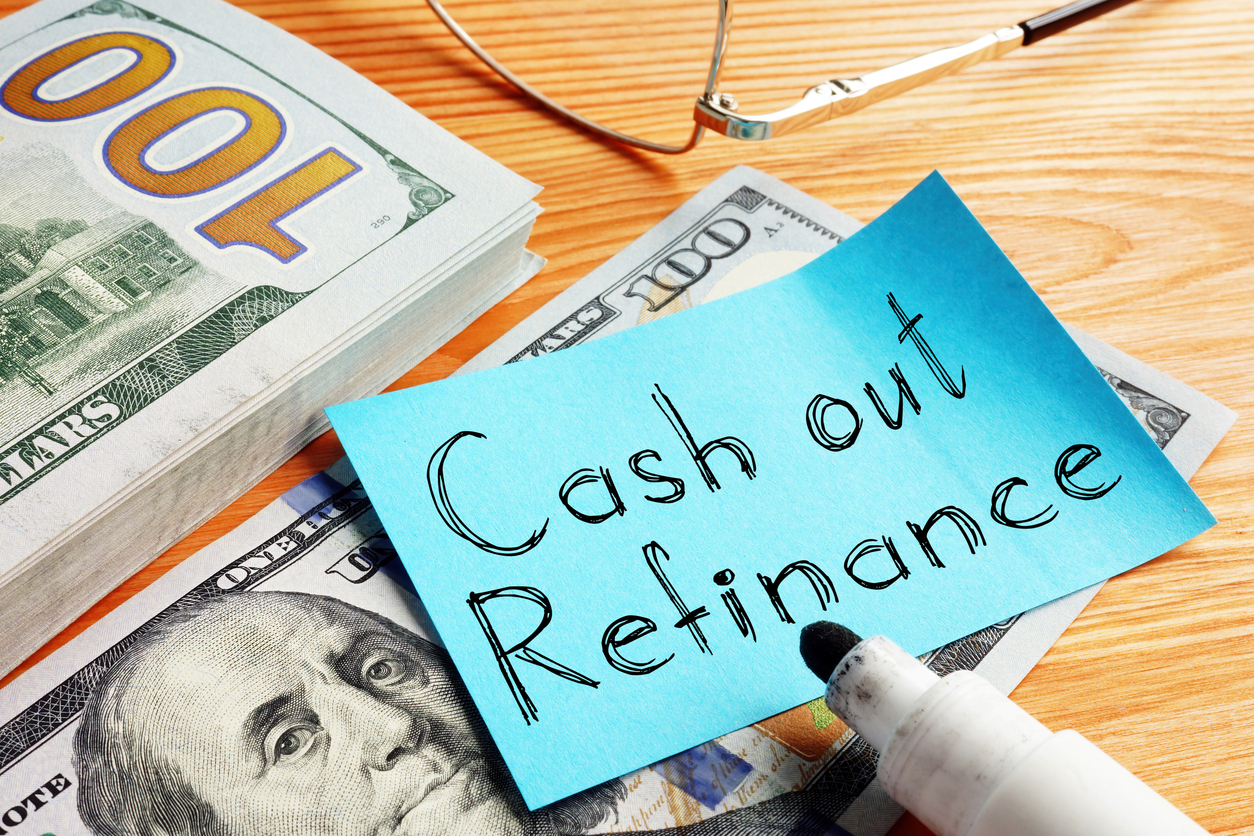Wondering whether you should refinance and cash-out with a new mortgage? Check out our detailed guide to learn all the ins and outs of such a loan. You can refinance and cash out if you’ve built equity in your home. It’s common for people to refinance their mortgage and take cash for significant expenses.
Whether that’s a good idea depends on your unique circumstances, current rate, and how it differs from the one you already have. It’s a large financial undertaking, so you must consider all the nitty gritty details before deciding.
I will discuss everything you need to know about cash-out mortgage loans, including their requirements and pros and cons, so you can decide whether it’s a good move for you.
What Is a Cash-Out Refinance Loan?
Refinancing a home involves replacing the current mortgage with a new one with unique terms. With a cash-out refinancing, you can turn the equity in your home into cash.
In such a scenario, your current loan is replaced with a new one by paying off the remaining mortgage balance and the difference is given to you as a lump sum cash.
In other words, you replace your existing mortgage with a bigger one and take cash based on your equity and your home’s current value.
Cash-Out Refinance Types
Cash-out refinance mortgages can be roughly divided into two distinct categories: conventional and government-backed.
Banks and lenders offer conventional cash-out refinancing loans. The other type is also provided by banks or lenders but is backed by government agencies and has set conditions. Government-backed loans are typically more accessible, especially for individuals with low credit scores.
The government-backed cash-out refinance loans include:
- FHA Cash-Out Refinance: This type of loan is backed by the Federal Housing Administration and is available for individuals with a low credit score, with a loan-to-value (LTV) ratio of a maximum of 80 percent. You don’t have to have an existing FHA-backed mortgage to apply. Learn more about other FHA mortgage refinance loans.
- VA Cash-Out Refinance: The Department of Veterans Affairs (VA) offers this refinancing option exclusively to eligible veterans, active-duty service members, and, in some cases, surviving spouses. It has the most flexible terms and can be applied with 100 percent LTV.
- USDA Cash-Out Refinance: The U.S. Department of Agriculture (USDA) offers this refinancing loan for rural homeowners with USDA loans. Like FHA-backed loans, the LTV is limited to 80 percent. Credit requirements can be high depending on the lender.
How Does Cash-Out Refinancing Work?
A cash-out refinance mortgage uses the home as collateral. It is just like the mortgage you already have. The only difference is that you borrow more money by turning your home’s equity into cash.
That means that to refinance with a cash-out, you must have some equity in your home, typically at least 20 percent.
You’ll start the process by finding a lender (conventional or government-approved, depending on the type of refinancing). The lender will assess your current mortgage by examining how much you’ve paid and still owe. They’ll also conduct a home appraisal to estimate the value of your home and consider your creditworthiness.
Suppose your home is worth $250,000, and you’ve paid $100,000 already. That means you have $100,000 in equity. You can cash out this equity amount with the new mortgage minus any closing costs associated with the refinancing.
The new loan will have its own rate and term, which can be shorter or longer per your request or lender’s offer. Generally, homeowners prefer to refinance with a lower rate.
That said, a cash-out mortgage typically has higher rates than standard refinancing because it results in less or no equity for the homeowner, and the lender assumes all of the risk.
What Are the Requirements for Refinancing Mortgage with a Cash-Out?
To qualify for a cash-out mortgage refinancing, you must meet some basic requirements. The specifics vary by lenders, but knowing the minimum requirements will help you understand whether this is even an option for you.
Here are the requirements for cash-out conventional refinance:
Home Equity
As I mentioned, you must have built some equity in your home by paying off part of the mortgage. Most lenders require applicants to have at least 20 percent equity.
You can calculate it by subtracting the amount you still owe in the mortgage from the current appraised value.
Credit Score
Your credit score is vital for a cash-out refinance loan because this is a bigger loan and essentially a new loan.
Lenders may set minimum credit score requirements for refinance applications. However, some lenders may also accommodate individuals with low credit scores, but they’re usually offered high interest rates. You can also use a co-signer who exceeds the minimum credit score requirements.
You can get the best cash-out refinance rates with a higher credit score, say 700 or above.
Debt-to-Income (DTI) Ratio
Your DTI is also important for lenders as it demonstrates your ability to make timely monthly payments. It’s the ratio of the debt you’ll owe and the pay you get every month.
Most lenders require a DTI of 45 percent or less. If your DTI is high, you may be able to satisfy the requirement with six months of reserves in your bank account.
Seasoning
The seasoning requirement stipulates that you must have owned the home for at least six months. The only exceptions are if you inherit or receive your home as a gift.
How Much Money Can You Get When You Refinance and Cash Out?
Lenders usually allow homeowners to borrow up to 80 percent of their home’s current appraised value with a cash-out refinance plan.
Know that you don’t cash out this whole amount; you must use the funds from the new loan to pay off the existing loan.
Let’s say your home is worth $300,000, and you still owe $200,000 on a loan. Your LTV ratio is 67 percent, which is less than the maximum of 80 percent.
With the new mortgage, you can borrow up to $240,000 (80 percent of $300,000), of which $200,000 will go toward paying the original loan. You can cash out the remaining $40,000.
So, the maximum amount you can cash out is the difference between what you owe and your home’s current appraised value.
Remember that other factors, such as the LTV and your credit score, are at play.
Benefits of Cash-Out Refinance Mortgage
Refinancing with a cash-out can offer several advantages:
- Lower interest rate: You can get a better rate with the new loan if the rates have dropped since your first mortgage or you’ve improved your credit score. Improved interest rates can render a cash-out refinance advantageous, particularly if they are lower than your current rates, or if your financial standing has strengthened, enabling you to qualify for more favorable terms.
- Access to lump sum cash: With a cash-out refi, you can get a large amount of money, which can be (and should be) used for important expenses like consolidating debt, home renovation, or higher education. Opting for a cash-out refinance for debt consolidation purposes could lead to reduced monthly expenses, potentially alleviating financial strain, particularly if burdened with high-interest consumer debt.
- Tax advantage: If you’re refinancing with cash-out for home renovations, you can avoid paying taxes on the cash.
Drawbacks of Cash-Out Refinance Mortgage
- Bigger loan, less or no equity: Refinancing with cash-out results in you losing equity in your home. More importantly, it replaces your current loan with a bigger loan, which means more debt and likely decades of monthly payments, which may be higher than what you’re currently paying.
- Risk of losing your home: Your original mortgage carries the risk of losing a home, but this new mortgage increases that risk.
A cash-out refinance on your home can give you a large sum if you have equity. How much you borrow overall and how much you get in cash depends on several things, such as your home’s value, the current mortgage balance, your overall DTI, and your credit score.
FAQs on Cash Out Refinancing
Is it smart to do a cash-out refinance?
It makes sense to refinance with cash-out if you can get cash at a potentially lower rate than a personal loan or credit card. It may also be worth it if you’re getting a lower rate than your previous mortgage.
Remember that this would likely be a bigger mortgage spread out over decades, so it’s a big financial undertaking.
Is it easy to qualify for a cash-out refinance mortgage?
The majority of lenders stipulate a minimum credit score of 580 for refinancing eligibility and 620 for accessing cash. Should your score fall below this threshold, it may be prudent to prioritize its enhancement before initiating the application process, or alternatively, explore options tailored for refinancing with suboptimal credit.
What is the cost of refinancing and cash out?
When refinancing a home with cash-out, you must bear the closing fees. Lenders typically charge an origination fee of 1 to 1.5 percent of the loan amount. Then, there are other costs like appraisal fees or credit check fees.
The cost of refinancing can range from three to five percent of the loan amount.
What is the difference between a cash-out refinance and a home equity loan?
According to the RefiGuide, both a cash-out refinance and a home equity loan allow the homeowner to borrow money using their home equity, there are significant differences. With a cash-out refinance, you replace your current mortgage with a new one, and you take the difference between the mortgage balance and the home value.
On the other hand, a home equity loans are like a second mortgage, where you can borrow money equivalent to the equity in your home up to a certain limit.
Takeaways
Considering the many benefits of the cash-out refinance, you can furnish you with additional cash reserves, facilitating the pursuit of various personal financial objectives. Whether it entails financing a home renovation, settling medical bills, or purchasing a property share from a former partner in the event of divorce, the proceeds from a cash-out refinance can serve diverse needs.
I would only recommend refinancing with a cash-out if you’re getting a better rate and plan on using the cash for something important like home repairs or debt consolidation.
If you have a good credit history and ample equity in your home, you can negotiate for a better rate.
Also, it’s best to cash out with only the amount you actually need. Taking on more debt than necessary while losing all equity in your home is not the best decision.



